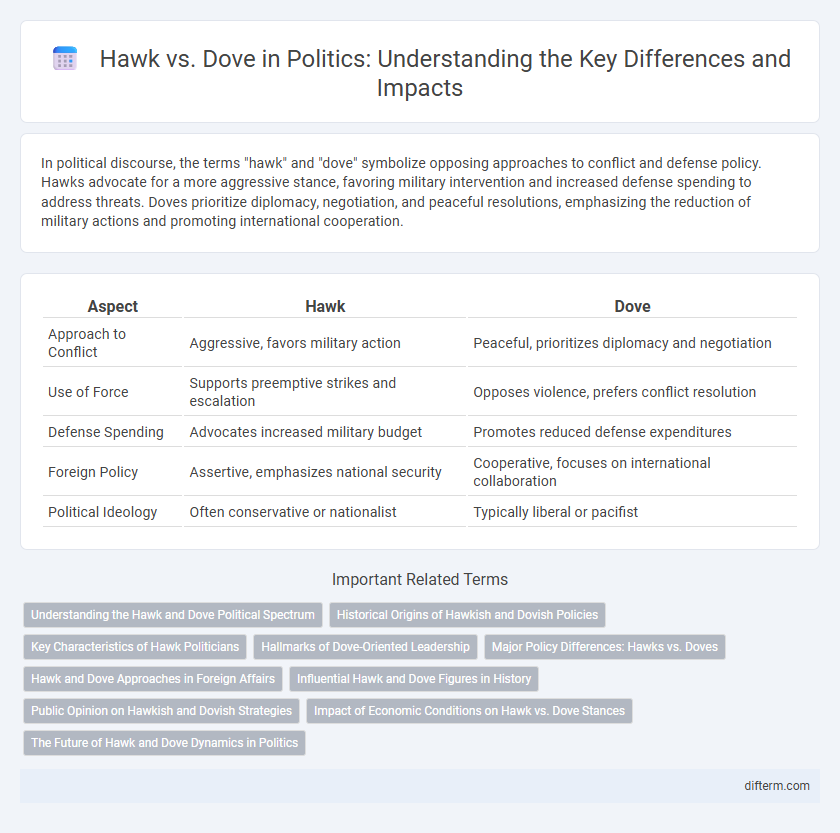In political discourse, the terms "hawk" and "dove" symbolize opposing approaches to conflict and defense policy. Hawks advocate for a more aggressive stance, favoring military intervention and increased defense spending to address threats. Doves prioritize diplomacy, negotiation, and peaceful resolutions, emphasizing the reduction of military actions and promoting international cooperation.
Table of Comparison
| Aspect | Hawk | Dove |
|---|---|---|
| Approach to Conflict | Aggressive, favors military action | Peaceful, prioritizes diplomacy and negotiation |
| Use of Force | Supports preemptive strikes and escalation | Opposes violence, prefers conflict resolution |
| Defense Spending | Advocates increased military budget | Promotes reduced defense expenditures |
| Foreign Policy | Assertive, emphasizes national security | Cooperative, focuses on international collaboration |
| Political Ideology | Often conservative or nationalist | Typically liberal or pacifist |
Understanding the Hawk and Dove Political Spectrum
The Hawk and Dove political spectrum characterizes opposing foreign policy approaches, with Hawks advocating for aggressive military action and defense spending to protect national interests. Doves prioritize diplomacy, negotiation, and conflict resolution to avoid war and reduce military involvement. This framework helps analyze political leaders' stances on defense policies, international relations, and national security strategies.
Historical Origins of Hawkish and Dovish Policies
Hawkish and dovish policies trace their origins to classical political theories and Cold War diplomacy, where hawks advocated for military strength and aggressive foreign interventions to deter adversaries, while doves supported diplomacy and conflict resolution to avoid warfare. The terms gained prominence during the Vietnam War, reflecting deep divisions in U.S. policy debates over interventionism versus restraint. These historical roots continue to shape contemporary political discourse on defense spending, international relations, and national security strategies.
Key Characteristics of Hawk Politicians
Hawk politicians prioritize aggressive foreign policies, advocating military strength and intervention to advance national interests. They emphasize defense spending, deterrence through power projection, and a hardline stance against perceived threats. Hawks often resist diplomatic compromises, viewing conflict as a necessary tool for maintaining security and influence.
Hallmarks of Dove-Oriented Leadership
Dove-oriented leadership prioritizes diplomatic engagement and conflict resolution through negotiation rather than military intervention, emphasizing empathy and the protection of human rights. It fosters collaboration among diverse stakeholders to achieve long-term peace and stability, often advocating for multilateralism and international cooperation. This approach values transparency, non-aggression, and the mitigation of war-related humanitarian crises as fundamental principles guiding policy decisions.
Major Policy Differences: Hawks vs. Doves
Hawks advocate for aggressive military strategies and increased defense spending to confront perceived threats, emphasizing national security and deterrence. Doves prioritize diplomatic solutions, conflict resolution, and reduced military intervention, stressing the importance of international cooperation and humanitarian concerns. These divergent approaches shape foreign policy debates, influencing decisions on war, peacekeeping, and defense budgets.
Hawk and Dove Approaches in Foreign Affairs
Hawk and Dove approaches represent contrasting strategies in foreign affairs, with Hawks advocating for aggressive, military-based policies to assert national interests and deter threats. Doves promote diplomatic engagement, negotiation, and conflict resolution, emphasizing peaceful solutions over force. Understanding these divergent perspectives helps shape foreign policy decisions and balance national security with global stability.
Influential Hawk and Dove Figures in History
Throughout history, influential hawk figures like Winston Churchill and Henry Kissinger have shaped aggressive foreign policies emphasizing military strength and intervention to protect national interests. Conversely, renowned dove leaders such as Mahatma Gandhi and Jimmy Carter championed diplomacy, peace talks, and nonviolent conflict resolution to achieve lasting international harmony. The contrasting approaches of these figures continue to influence contemporary political strategies and debates on war and peace.
Public Opinion on Hawkish and Dovish Strategies
Public opinion on hawkish strategies often associates them with national security and a strong defense posture, appealing to voters prioritizing military strength and assertive foreign policy. Conversely, dovish strategies attract support from those advocating for diplomacy, conflict resolution, and reduced military intervention to avoid prolonged wars and foster global cooperation. Polls indicate fluctuating public preferences depending on current international tensions, economic conditions, and political leadership rhetoric.
Impact of Economic Conditions on Hawk vs. Dove Stances
Economic conditions significantly influence Hawk versus Dove stances, with hawks typically advocating for increased defense spending during periods of economic growth to bolster national security. Conversely, doves often emphasize social welfare and diplomatic solutions, especially in times of economic downturn, prioritizing budget reallocations away from military expenditures. Fluctuations in GDP, unemployment rates, and inflation directly impact public support for either hawkish or dovish policies, shaping political agendas and foreign policy strategies.
The Future of Hawk and Dove Dynamics in Politics
Hawk and Dove dynamics in politics will increasingly shape international relations as nations balance military aggression with diplomatic negotiation. Emerging geopolitical tensions and shifting power structures underscore the importance of strategic hawkishness alongside dovish conflict resolution. Technology in warfare and global public opinion will also influence how political actors adopt and adapt these opposing stances.
Hawk vs Dove Infographic

 difterm.com
difterm.com